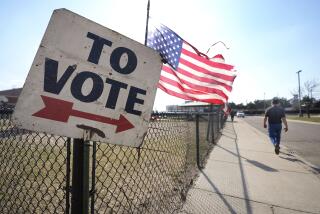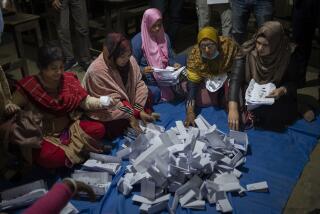Egypt votes in divisive referendum on constitution
CAIRO — Egyptians began voting Saturday on a constitution that sharpens divisions between Islamists and secularists and intensifies the dangerous struggle over the country’s political identity nearly two years after the overthrow of Hosni Mubarak’s police state.
Voters streamed through slums and wealthy enclaves in an uninspired atmosphere on a day meant to enshrine hallowed ideals into law. Soldiers and police stood guard and questions arose about whether judicial supervision was adequate.
Strong opinions hushed any hint of consensus, and many said they believed the country’s polarization would only deepen after the votes were counted.
The voting encompassed Cairo and cities in 10 governorates. Official results won’t be released until the second and final day of balloting in other regions next Saturday.
State media and the Muslim Brotherhood reported that preliminary results show the majority approved the constitution even in opposition strongholds. But opposition parties cited irregularities and said about 65% of voters cast ballots against the charter.
“This constitution just isn’t right,” said Ayat Ahmed, a homemaker in a neighborhood of craftsmen and mechanics. “It doesn’t represent anyone, so why are they trying to rush it through?”
The document, drafted by an Islamist-dominated assembly, symbolizes the failure of President Mohamed Morsi’s government to unify Egypt after 30 years of autocratic rule. The country has broken into two camps: Islamists who view the draft constitution as a gradual step toward sharia, or Islamic law, and liberals who fear that the document endangers freedom of expression and rights for workers, women and Coptic Christians.
Many Egyptians indicated that their yes vote was less an endorsement than a hope that a new constitution would end months of political turmoil marked by deadly clashes and beleaguered financial markets.
“We’ve been living through instability for a year and a half. The economy is suffering,” said Hassan Ahmed, a government employee. “We are ready for the constitution because we are ready to have a parliament. We want stability back.”
Turnout was high among Egypt’s 51 million eligible voters and polling was extended by more than three hours: Hundreds of women — some peering through face veils, others wearing designer sunglasses, their hair uncovered — waited outside a school in a neighborhood of gardeners and luxury cars. But in a faraway working-class neighborhood, laborers trickled into a polling station.
Security officials reported violence that was mostly minor except for a case in which Islamists firing rubber bullets and hurling gasoline bombs attacked the offices of an opposition party newspaper. Reports of voting violations surfaced Saturday night, including unstamped ballots, Islamists trying to sway voters in polling lines and Christian women being denied the right to vote.
But many Egyptians complained that the document was finished only two weeks ago in a 16-hour surreal session by an Islamist-led assembly hurrying to preempt a court decision questioning its legitimacy.
“We had 10 days to look at this constitution,” said Mohamed Gamal, owner of a clothing story in the poor Cairo district of Shubra. “Even the educated are not able to understand it in such a short period, and we have a huge portion of society that is illiterate.”
The proposed constitution is not overtly Islamic. It mirrors the constitution under Mubarak by stating that Egypt will be guided by the “principles” of sharia. But vague new language and an article allowing clerics to be consulted on legislation have stirred concern that the Brotherhood and conservative Islamists could manipulate the charter.
The document galvanized a disparate opposition concerned that Morsi, once a leader in the Brotherhood, is edging toward unrepresentative government. The opposition’s cohesion includes unlikely alliances between leftists, Mubarak loyalists and upper-class Egyptians who for decades had steered clear of politics.
“There can’t be one segment of society writing a constitution,” said Injy Maher, an accountant from Old Cairo, referring to the Brotherhood. “There is an article that states that we must live by family traditions, as if we aren’t already. Who gives the state the right to dictate what these family traditions should be? The hard-line Islamists want us to live by their rules. This is unacceptable.”
Morsi and the Brotherhood may win, but they will preside over a bitter nation and a battered economy. The Brotherhood’s credibility has been steadily slipping because of broken promises and Morsi’s move last month to put his office and the constitutional assembly beyond judicial oversight. Hundreds of judges retaliated by refusing to oversee the referendum, which caused it to be extended to two days.
“If this constitution was fair, we wouldn’t have all of the opposition against it,” said Adel Ameen, voting in a school surrounded by vegetable stalls. “This can’t be right.”
Many believed that the Brotherhood might herald a tolerant political Islam that would inspire Arab governments rising from the upheaval across the Middle East and North Africa. But the Brotherhood, the world’s largest Islamic organization, has shown an increasingly authoritarian streak. Morsi explained his expanded power as necessary to counter Mubarak-era holdovers seeking to sabotage Egypt’s political transition.
Some analysts suggest the battle over the constitution foreshadows a slide in the Brotherhood’s popularity that may damage its chances to dominate the next parliament, which, if the constitution is passed, will be elected early next year. The Brotherhood’s appeal showed signs of slipping in June when Morsi defeated a Mubarak crony by winning only 51% of the vote.
Morsi and the Brotherhood would be significantly weakened if the draft constitution is rejected. Many Egyptians, though, wonder when the power plays and political unrest will end.
“There shouldn’t be this kind of division when it comes to the constitution,” Maher Fakhry, a government employee. “After the revolution, we expected a constitution that would secure our rights.
“Some people will boycott because they are afraid there will be fraud, but boycotting is passive. We must all say no.”
He added: “After 30 years of oppression, we’ve had enough. Let our future generations live free.”
Abdellatif is a special correspondent.
More to Read
Start your day right
Sign up for Essential California for news, features and recommendations from the L.A. Times and beyond in your inbox six days a week.
You may occasionally receive promotional content from the Los Angeles Times.







